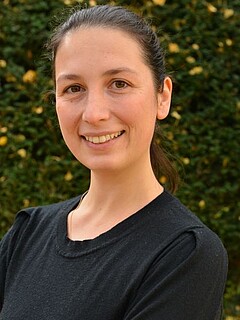PhD students 3rd cohort

Dajana Daum, M.A.
dajana.daum@uni-jena.de
Curriculum Vitae
2009-2015 Bachelor of Arts in Slavistics and Educational Science at the University of Hamburg
2011 + 2013 Student Tutor for the Introduction to Russian Literary Science at the University of Hamburg
WS 2011/2012 Exchange semester at State University Saint Petersburg, Russia
2014-2015 Student assistant in the research project „Russian and Polish heritage language as a ressource in school?“ at the University of Greifswald“
2015-2019 Master of Arts in „Literature-Arts-Culture“ with main subject Russian Literary Science at Friedrich-Schiller-Universität Jena
WS 2017/18 Student Tutor for South Slavic Literary Science at Friedrich-Schiller-Universität Jena
10/2021-09/2024 PhD student and research associate at the Research Training Group “The Romantic Model”
04/2023-06/2023 Internship at Romantikerhaus Jena
10/2024-03/2025 Research Assistant at FSU Jena
Teaching
- „Die Serapionsbrüder von Petrograd.“ SoSe 2024. Gemeinsam mit Prof. Andrea Meyer-Fraatz
PhD Project
Revolution and science - romantic ideals in the works of Andrei Platonov (WT)
The dissertation project is dedicated to the works of the Russian author Andrej Platonov (1899-1951) and examines it on the basis of an understanding of romanticism that is derived from the concept of romanticism as a continous phenomenon in modern societies. The question arises as to what extent and why a romantic poetic figure is present in Platonov's texts. The presence of a romantic utopian striving for a ‘golden age’ and its failure to achieve it could be seen as a plausible reaction to the radical changes that came with the Russian Revolution 1917 and the process of socialist construction. Taking particular account of the themes ‘Romanticism and sciences’ and ‘Romanticism and politics’, Platonov's works are brought into closer contact with early Romantic poetics, especially that of Friedrich von Hardenberg, and its specific interweaving of art, (moral) philosophy and science for the first time.
Publications
Edited Volume
- „Romantische Philosophie. Vertreter – Positionen – Themen.“ Hg. v. Dajana Daum u. Matthis Glatzel. Frank & Timme, Berlin 2024.
Article
- „Das Dorf als sozialistisches Experimentierfeld in Andrej Platonovs Roman 'Čevengur' (1926/28)“, in: Zeitschrift für Germanistik (2024), H. 3, S. 627–643.